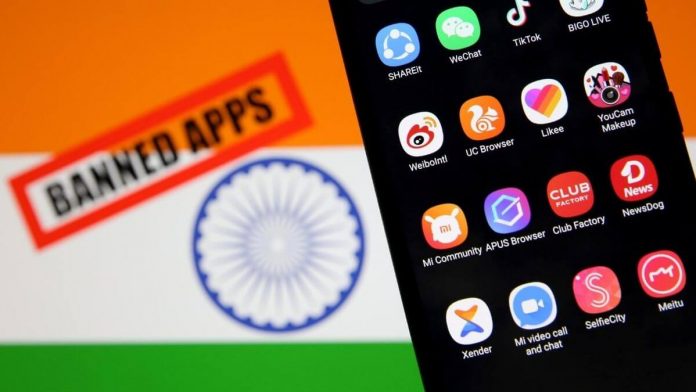This brief is written by Priyanka Cholera, from MKES College of Law, Mumbai University.
Guest speaker: Sachin Kalra, Deputy General Counsel, HT MediaSachin Kalra is a Corporate Attorney with substantial in-house legal experience of 16 years, Holding an LL.M. degree in Corporate Law, focusing on litigation, arbitration, advisory, contract management, and team management.
Host: Ramnauj Mukherji is an alumnus of the National University of Judicial Sciences, Kolkata. He is currently the CEO of LawSikho and the co-founder of iPleaders. His previous work experience includes being a part of the Private Equity and M&A Team at Trilegal, Mumbai.
How and why were the 59 Chinese Apps banned?
Provisions of Section 69(a) of the Information Technology Act 2000, empowers the government, to take steps to protect the sovereignty, integrity, defense, security concerns of the country, and the Central Government or the person appointed by it should be satisfied convinced, for the notion of blocking any activity on websites and he has to record the reasons accordingly. The Emergency rule, under Rule 9 of the said act states that Suo Moto’s action to block Site can be taken by the person authorized within 2 days, skipping all the reason and processing part. It is advisable to have a hearing and reasoning for the act. The government has formed the inter-ministerial panel, to allow apps for defending themselves. The hierarchy followed is, The intermediary contract officer approaches the Nodal Officer, the Nodal Officer Approaches the Designated Officer (D.O) if the D.O is convinced of the notions put forward he can Approach the Chairman of examination Report, and if the latter approves of the contentions the matter will reach to DIT Chief Secretary will pass the order with the recommendation from D.O; The other way of doing it is Court passing an order to block the websites, there have precedents about supreme court passing the order in favor the discussed section.
What are the allegations against the App?
The allegations are the following- Data breach, Security of Citizens, Privacy concerns; all of the mentioned can be against the national interest of the country. They are capturing data and storing it in foreign country servers that are harming the sovereignty of the country. There are reports and complaints submitted before the Cyber Crime cells and Ministry of Home Affairs, all are unanimous in their opinion about the app.
What about other country apps like Gmail or Facebook that save data outside India
Data localization is only mandatory for finance records and it is imposed by RBI, however, there is no similar rule for other records. Currently, there is no comprehensive data privacy rule and there are data privacy rules under the Information Technology act but it does not address the topic of outside country servers.
What does the Ministry of Electronics and Information Technology mean by ‘are stealing of data’
The apps which are banned were accessing data it was not authorized to. Due to the current pandemic, everything is going global through the internet. Hence everyone’s account details are vulnerable to these websites, who can access it and steal it from the Third Party. And preventing their access is important for national security. Even if the consent is provided it cannot be used against the national interest. Every such app has to pass the test of law.
How does ‘data leak threat’, hold up as a reason to ban Chinese apps, given that many other apps in the market are involved in the same violation
In 2019 Madras High Court had banned Tik-Tok, this ban was withdrawn after their appeal in the Apex Court. In the current situation, there will be a hearing and reasoning process conducted for the Apps that are banned by the government. However, the country in the question itself does not have a liberal policy about internet liberties. China itself has banned many apps and websites concerning Data Privacy, such as Google, Facebook, etc; Even Countries like USA and Australia have banned Chinese apps concerning data privacy and national interest Fitness Apps and WeChat App respectively.
Do exclusive banning Chinese apps seem negative biased
The government is wise enough to take steps only when they have concrete proof for it. The banning of Chinese apps is backed by various reports which contain the proof of allegations the government is claiming it to be. Even the court of law, all apps have to represent themselves separately and not as Clubbed ’59 banned apps’. The government will also be asked to show the proof and the data in the current situation, as rule 9 of emergency was invoked and the due process was not followed.
What is the remedy available to banned apps?
The order passed under Rule 9 is interim, hence all websites banned approach the government, review committee should review websites banned. The apps which are banned can approach the Supreme Court under Article 19 of the Indian Constitution by the means of writ petition.
Which International Treaties are applicable for the ban
India has a bilateral treaty with China and is a member of WTO, hence both GATS and GATT apply to the Ban of Apps differently. There are exceptions under Article 21 of GATT and Article 14 of GATS In emergency circumstances, the parties to the agreement can take a step in discordance to it, in such cases conciliation proceedings take place, panels will be set up and reports will follow on the case. The losing party has to oblige to the reports or risk being debarred from GATT. In 2014 Russia and Ukraine had disputes and Russia Blocked the trade between Ukraine and Kazakhstan that were routed through Russia when the concerns rose in WTO, and Russia stated its reasons of banning trade as political and economic differences, followed this WTO released a report stating that Political and economic differences cannot be stated as ‘Emergency’.

In what ways can the Indian government explain the invocation of the emergency clause
The government can defend its action only by stating the banned apps are probable causes of harm to the sovereignty, integrity, and security of the country. If the Indian government can prove the country in question has access to sensitive information like the military, then regardless of data theft proven or not. Access to data itself is a threat to national security. Especially in cases where both countries in question are undergoing border dispute or potential war threats. All of these reasons make up to be a national emergency and the government can put forward the contention to withdraw access from foreign apps.
How can WTO interject this matter?
India and China both being members of the same international forum, there will be interjection by WTO. And it has a separate body to deal with such conflict related to trade and services. China can invoke it the same. If the WTO takes the matter then there will be conciliation proceedings of 60 days, if both parties resolve within the given period it would be ideal for both parties but if that doesn’t happen then there is a process of Panel establishment, will look into the complaint and submit the report, in case any party losses in the report, it has to comply to it, immediately. There is also the provision of appeal with the WTO appellate tribal. These proceedings are covered by Articles of WTO Settlement Understanding, also known as Dispute Settlement Understanding, from Article 4 to 16, states the discussed proceedings.
What about the bilateral investment protection treaties (BIT)
A bilateral investment treaty is a treaty signed by two countries for the benefits of FDI because BIT says that the investment made by investors e.g. America invests in India through BIT, then the foreign investment will be given as much as importance or more importance than an In-House investment. And if the government takes any action that causes breach of the clauses or expropriation of the BIT, then the Investment can take up an arbitration against the Government, and the government may be liable to compensate the Investors. As of 2018 India has ended its bilateral treaty with 60 countries including China and adopted a new model.
What are the pillars of the data privacy policy for Indian apps and foreign ones?
Every company has to abide and collect data by the definitions of data privacy, any act beyond the definition will be considered as data obtained and used. The Data Privacy Draft Rules, made by the government should be brought into implementation by the Parliament, as every definition concerning data privacy is covered in the draft.
(questions by the audience)
What about the employment of people working for these banned apps
It is an opportunity for Indians to work with other new investors and better projects, as after the ban of apps India is a new market for similar services and it will create employment.
What arguments could be put forth by the banned apps concerning Article 19 of the Indian Constitution
Arguments will surround two main concerns that, that the 59 apps in question were not individually heard before banning their services and the reasons have not been recorded as the ban was invoked under the emergency provision concerning rule 9 of the IT act 2000. Both of the reasons discussed empower the apps in question to move court under Article 226 and 32 (writ provisions ) in the Constitution of India.
Can the Indian Government reclaim the data? What if the data is already leaked?
If the data privacy rules are implemented then any individual can retrieve its data by writing to the concerned company and even in the ambit of Right to Privacy one can retrieve data. And if the data seems to be leaked then After the reports presented by the Apps, the Government will take a call accordingly, In cases where the data is already leaked and prone to misuse, the Indian government will have to take steps towards retrieving it.
LawSikho has created a telegram group for exchanging legal knowledge, referrals and various opportunities. You can click on this link and join:
 Serato DJ Crack 2025Serato DJ PRO Crack
Serato DJ Crack 2025Serato DJ PRO Crack










 Allow notifications
Allow notifications


